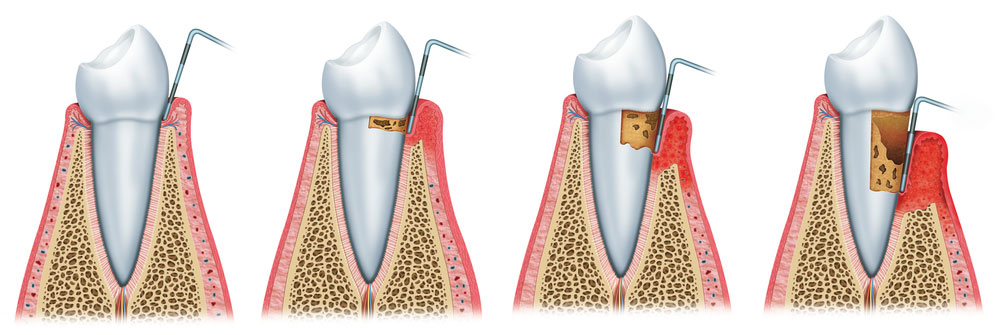
Did you know that periodontal disease is one of the most common chronic infections in humans? Periodontal (gum) disease, which is also called periodontitis, is a progressive disease. The bacteria found within plaque are present in vascular and heart disease. Studies have shown that people with moderate or advanced gum (periodontal) disease are more likely to have cardiovascular disease or heart disease that those with healthy gums. Periodontal disease is the #1 cause of tooth loss in the United States. Gum disease begins with the inflammation and irritation of the gingival tissues which surround the supporting teeth. The cause of this inflammation is a bacteria found in plaque which causes an on-going bacterial infection. The bacterial infections form in the gingival tissue and causes deep pockets to form between the teeth and gums.
The early stage of this disease is called gingivitis. The gums may become red, swollen and may bleed easily. Good oral hygiene at home is essential to help keep gum disease from becoming more serious. You don’t have to lose teeth to periodontal disease. If treated with regular dental visits, brushing, flossing between the teeth and a balanced diet, this early stage of gum disease is reversible.
The most effective way to treat gum disease is a cleaning procedure called Scaling and Root Planing. This procedure is also known as a deep cleaning. It is usually done under local anesthetic and normally takes 2 appointments to complete. The hygienist removes the tartar, plaque and bacteria from above and below the gum line (scaling) and rough spots on root surfaces are smoothed or planed. This procedure helps gum tissue to heal and pockets to shrink. Special medicated mouth rinses and localized medications may be recommended to help control infection and healing. Discomfort following scaling and root planning is rare.
It only takes twenty four hours for plaque that is not removed from your teeth to turn into calculus (tartar)! Daily home cleaning helps control plaque and tartar formation, but those hard to reach area will always need special attention. Once your periodontal treatment has been completed, your dentist and dental hygienist will recommend that you have regular maintenance cleanings (periodontal cleanings), usually four times a year. At these cleaning appointments, the pocket depths will be carefully checked to ensure that they are healthy. Plaque and calculus that is difficult for you to remove on a daily basis will be removed from above and below the gum line.
Good oral hygiene practices and periodontal cleanings are essential to maintaining dental health and keeping periodontal disease under control.